How to Have More Patience as a Mom

How to Have More Patience as a Mom
Being a mom can be frustrating sometimes. It's not easy taking care of tiny humans. Here's how to stay patient through all the chaos.
Written by Liz Bayardelle, PhD | See Comments | Updated 02/24/2019
Want to cut to the chase?
Mom's Guide to More Patience
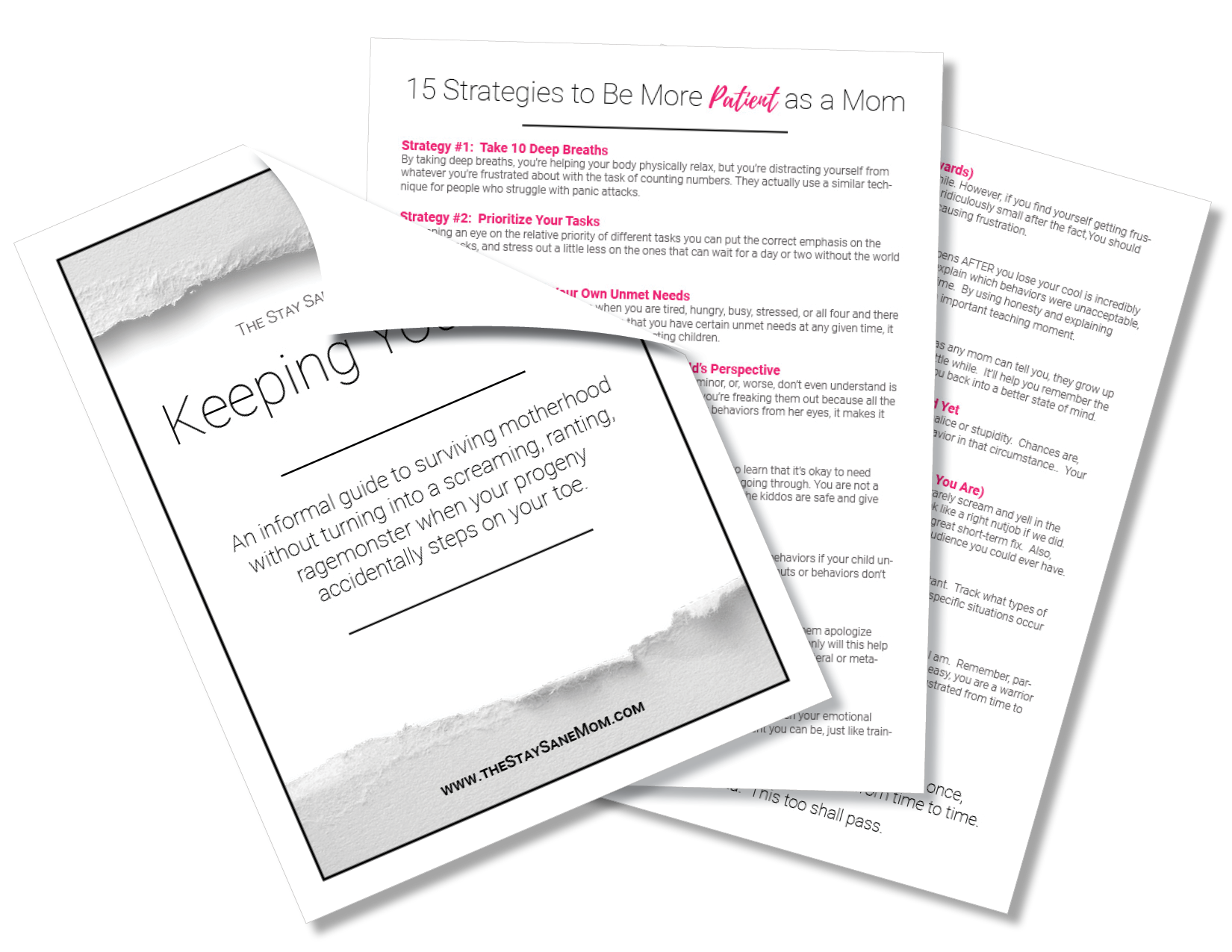
Want to cut to the chase?
Mom's Guide to More Patience
Get the Free Printable Cheatsheet Now
Get it NowHow to Have More Patience as a Mom
We've all been there. It’s that glass of milk accidentally pushed off the table. The dog gets into the garbage one more time. It can even be something as innocuous as a fifteenth (albeit polite) request for a favorite toy.
And then it happens.
You are no longer the well-spoken, intentional, loving mother you are 23 hours 57 minutes of the day. In that second a parental rage monster sweeps over you, you unintentionally start doing your Bruce Banner impression, and you don't realize just how scary you are until you see the look on your kid's face.
You lost it. Again.

Guilt washes over you. You attempt to soothe the fear out of your probably now-crying child, but even after they are happily playing once more, it doesn't make you feel any better about having lost your temper.
Even worse, it's not usually for a good reason.
It's usually for something small, insignificant, and so stupid if you told your spouse about it they would probably laugh (hopefully with you, not at you...if they know what’s good for them).
Momming is an incredibly hard job. You hear this all the time before you have kids, so you don't really realize just how true it is until after you live in a house in a responsible for another human's wellbeing 24 hours a day.
I know for me the scariest part was when my toddler started emulating my rage-monster behaviors. Seeing her precious little face contort into such ugly (and familiar) expressions...yeah, not my finest maternal moment.
So that was when I began my grand research expedition on the big question:
How Can I Be a More Patient Mother?
This is a question for the ages.
Unfortunately, there is no magic bullet that will all the sudden make you 100% patient all the time. Goodness knows I would be the first in line if there was.
Despite this unfortunate fact, there are actual, quantifiable steps you can take to reduce your “momsplosion” moments.
However, before we get into tips and tricks, I find it very important to mention one prerequisite:
It's extremely important that you realize that you do in fact have good reason to be frustrated. You are not crazy. You are not a bad mother. It is not that you don't care about your children. It might even be exacerbated by how much you DO care about your children.
You are struggling to be perfect 100% of the time, completely responsible for another human's well-being all hours of the day, and usually, you're doing it on top of your other responsibilities and with less than optimal levels of sleep. Just completely human to get frustrated under these circumstances.
So, now that you’ve given yourself a little bit of a mom break, we can start going over some specific strategies to be a more patient mom.
Strategy #1: Take 10 Deep Breaths
This one kills two birds with one stone. Or changes two babies with one diaper. Whatever the parenting equivalent is that expression is.

By taking deep breaths, you're helping your body physically relax. You're giving your brain oxygen, which is necessary for higher reasoning functions (like reminding yourself you probably don't actually want to sell your children on eBay, no matter what your reptilian hindbrain is telling you).
Also, by counting to ten you're distracting yourself from whatever you're frustrated about with the task of counting numbers. They actually use a similar technique for people who struggle with panic attacks, so this has some actual basis in psychology.
Strategy #2: Prioritize Your Tasks
Try to think about things relative to their priority levels.
As moms, we often try to get a lot done at once. Often more than is wise. It helps to remind myself that, while what I’m doing is important, not everything I’m trying to get done will cause a nuclear war if it doesn't get done that exact day.
This isn't supposed to make you compromise on your productivity, but by keeping an eye on the relative priority of different tasks you can put the correct emphasis on the important tasks, and stress out a little less on the ones that can wait for a day or two without the world imploding.
Strategy #3: Be Aware of Your Own Unmet Needs
Unfortunately, you'll notice that I said “be aware of” not “immediately fulfill”.
You’re a mom now, so there will be days when you are tired and there is nothing you can do about it. There will be days when you don't get to eat because the baby has to nap and that's more important. There will be days when all you want is to cuddle with your spouse and have an adult conversation.
You won't always be able to fulfill all of these needs right away. That’s normal.
However, when they do go unfulfilled, it will probably make you cranky. Let me rephrase that: it most certainly makes me cranky.

Fortunately, by being aware that you have certain unmet needs at any given time, it helps you not take out those needs on your unsuspecting children.
No, I'm not really frustrated that you spilled the cereal on the floor, I'm frustrated because I haven't seen my spouse for more than 20 seconds all week and I've had to go to the bathroom since 9 am.
A little bit of self-awareness goes a long way here. I'm not recommending huge bouts of self-pity, but knowing that you have an unmet need helps you not funnel all those negative emotions in a bad direction.
Strategy #4: Look at Your Behavior from Your Child's Perspective
When you're frustrated, the thought process is “me, me, me”.
This doesn't make sense. You were the one that's exhausted. You were the one who's going to have to clean up the mess that just happened. You were the one who needs way more help when you're currently getting.
However, the road that takes us into the problem is very rarely the road that takes us out of it.
In order to break your frustration and switch back to your mild-mannered alter-ego, try considering how your behavior must look from your child's perspective.
Yes, they spilled something. Or touch something they weren't supposed to touch. Or broke something. They did do something wrong, but if you fly off the handle in a disproportionate rage, it's going to rock their basic fundamental sense of safety instead of teaching them not to do a specific bad behavior.

It is both a blessing and a curse, but until our kids start making friends and connections outside of the home, you are their rock. A majority of their confidence, security, and overriding sentiment that the world is a safe place comes from you and your behaviors.
If you fly off the handle for something they perceive as minor, or, worse, don't even understand is wrong, then you're not teaching them a lesson about behavior, you're freaking them out because all the sudden their world isn't a safe place anymore.
I'm not saying this to put more pressure on you, but to put things into perspective. I know I often get tricked into thinking my frustration might somehow to teach my daughter to be better behaved, but really I'm just teaching her that Mom is scary. This is not a message I want to send. Ever.
By thinking of my behaviors from her eyes, it makes it easier to keep my cool and reinforces why it’s important that I do.
Strategy #5: Don't Be Afraid to Take a Step Back
As moms, we talk ourselves into the idea that we have to be with our children 24/7. In the last week, I have definitely felt guilty for taking a shower by myself. True story.
However, in the height of frustration, it might be way more healthy for our child to learn that it's okay to need some space sometimes than to see us in the depths of whatever we're going through.
Make sure there are no physical dangers surrounding your child and that they can't escape wherever they are currently contained, and go take a few minutes to collect yourself.
(My personal favorite hiding spot is my laundry room.)

Take a few deep breaths in a quiet room. You can even set a timer for 3 minutes “me time” in which you can cry, scream, punch pillows, or do whatever behaviors you really wouldn't like your child to emulate if they see them.
You are not a bad person for needing space. You are not a bad mother for getting frustrated. You are a human woman trying to do a million things at once, and sometimes that system is going to break down.
Next time you feel frustrated, make sure the kiddos are safe and give yourself a few minutes. When you come back you'll be way closer to the mom you want to be than you would have been if you tried to power through it in their presence.
Strategy #6: Think "Will This Work?"
Ultimately your goal is probably to have your children behave.
On a very objective level, you can kind of think of it like dog training. (No, children aren't dogs, but any mom with a toddler has definitely seen at least a few similarities.)
When you learn how to train a new puppy, you learn that if a behavior is followed by something good or fun the puppy will do that behavior more often.
IMPORTANT PART: The flip side, that a behavior which is followed by something negative will happen less often, is ONLY true if they understand the connection between the bad behavior and the negative consequences.
I won’t speak for everyone, but most of the time when I get frustrated, best behavior that finally tips me into “ crazy mom mode” is only a very small percentage of why I'm frustrated. I probably been building towards it the entire day, but that's spilled glass of juice was what finally tipped me over the edge.
This means that if I get level 12 angry about a very minor accident, my kid isn't going to make the connection that spilled juice = bad things = don't spill juice, they'll make their connection that a very small accident can make someone very angry with you. Even worse, they could make the connection that making a mistake will make someone you care about love you less.
None of these are messages I want to send to my kids.
So, when you're frustrated, keep in mind that your actions will only decrease bad behaviors if your child understands what they did wrong and why that caused something bad. Unfortunately, it takes a very calm voice and repeated explanations to get children to understand much of anything.
This means that angry shouts or behaviors don't actually teach kids not to do bad things, they just frighten them.
If you can somehow dig deep and pull out a calm voice and a reasonable explanation, it will do mountains more for your child's behavior than a display of anger. Once they understand, you can calmly excuse yourself and go shout into a pillow.
Strategy #7: Help the Kid Fix It
To quote a movie (whose title I don't remember), I have been realizing that I have “ an overdeveloped sense of vengeance”.
This means that when my kids do something wrong, make a mess, or do something else that frustrates the heck out of me, the little voice in my head that wants things to be fair absolutely flips out.
It took me a lot of introspection to admit that most of my “ mommy tantrums” boil down to an overarching feeling that it (whatever “it” is) isn't fair to me.

However, since parenting is all about teaching our kids to survive in the adult world, helping them fix their own problems and clean up their own messes is actually a really important thing for us to do.
Even if it takes some extra time, help your kid clean up their own spilled juice. Make them apologize for what they broke. Have them do good behaviors to make up for the bad ones.
Not only will this help them learn that in the real world they will have to clean up their own messes (whether literal or metaphorical), it will also help you feel like this isn't all coming out of your hide.
And in addition, there's really nothing that calms me down faster than seeing my toddler honestly trying to clean something up. Something about the visual of her helping out soothes whatever well of inner rage has been accidentally uncovered.
Strategy #8: Remember Patience is a Muscle
This is another technique with actual psychological research behind it.
When you want to have a stronger physical muscle, like your biceps or abs, you repeatedly train that muscle group a little more than is comfortable, with breaks in between. If you can do 30 crunches comfortably, you do three sets of 40, with a minute break in between. The next day, you'll be able to do 35 comfortably, so you do three sets of 45.
This is a disgustingly over-simplified explanation for exercise, but it serves its purpose as a metaphor for patience.
The psychological research has shown that people who regularly operate at maximum capacity can over use their “patience muscle” in the same way that you would probably pull a muscle if you tried to run a marathon right now without training.
However, if you repeatedly exercise your patience, but insert small breaks in between in which your emotional reserve can build back up to normal levels, it will actually increase how patient you can be.
As a mom, you have no doubt witness this. Think of how your 18 year-old, single, college-student self would deal with your current lifestyle and all of its stressors. Can anyone say mental breakdown before 10 am? Yeah. You've grown a lot. Your “patience muscle” is incredibly buff, Mama.
Next time something frustrates you, pictures that you're just at the gym doing another set of reps to build up your “ patience muscles”.
Strategy #9: Evaluate Your Impatience (Afterwards)
This one isn't a tip for what to do while you are in the middle of a meltdown, but something you can use afterward. This is also especially helpful if you find yourself losing your cool frequently.
It's totally normal to have a meltdown every once in a while. However, if you find yourself getting frustrated regularly or getting frustrated by things that seem ridiculously small after the fact,You should definitely take a look at larger-scale things that might be causing frustration.
Typical culprits here include lack of sleep, not getting enough food, feeling overwhelmed on a grand scale (rather than simply in a specific situation), and (my personal favorite) committing to far more than you can actually achieve in a 24 hours a day.
If you find yourself becoming a “ frustrated person” rather than just a “ person who is frustrated sometimes” you might want to do some soul-searching and see if there's any stress in your life that can be removed. Check if there's anything you can do to change your schedule, your commitments, or other factors that might be causing friction in your head.
You can't always fix everything, but sometimes a few small changes can make a huge difference.
When I was in this place, my spouse started bringing our toddler with him when he went to go do errands like getting gas or picking up takeout food. These little 30 minute breaks would make the difference between a hellish day where I eagerly counted seconds until the kids’ bedtime to one in which I could actually enjoy my family with a genuine sense of joy (mostly).
If you find yourself trending towards regular frustration rather than frustration towards specific instances, definitely try and evaluate if there any stops you can pull to reduce your stress levels.
Strategy #10: Don't Be Afraid to Apologize
I have learned the hard way that my kids are going to ignore what I tell them to do in favor of what they see me do myself.
You are not going to be perfect 100% of the time. No human parent ever will. This means that sometimes you are going to lose your cool in front of your kids.
What happens AFTER you lose your cool is incredibly important.
Don't be afraid to tell them that you messed up, explain which behaviors were unacceptable, apologize, and tell them what you should do differently next time. You can even do this using the Socratic method, asking them how they think you should handle it next time you feel angry, upset, or overwhelmed.
Whatever they see you doing after you explode in a fit of mommy flames is what they will learn to do when they feel frustrated. It sucks, but you can actually use your frustration as teaching moments to help them handle strong emotions.
Yes, you are going to blow up sometimes. But by using honesty and explaining what happened and why it happened, you can turn this into an important teaching moment that will make you and your kids better for it.
How Do I Regain My Patience after I Lose My Cool?
The short answer is to execute strategies 1, 5, 4, 7, and 10, in that order.
Basically, after you have already snapped and become “ angry mom”, the most important thing is to minimize the impact it has on your family.
Usually, this means you should remove yourself into a separate environment for a few minutes so you can actually calm down. Seriously. Make sure your kid is in a safe place, and take three minutes on a timer hiding in the back of your closet to just be by yourself for a bit.
If this takes mental strength to accomplish, it might help to try thinking about things like how you're building your “patience muscle”, how your kids are going to model their behavior after yours, and how screaming outbursts do not actually reduce problem behaviors.
Once you come back, use the situation as a teaching moment to help your kids learn how to deal with strong emotions. You are human, but so are they. They will get frustrated. They will probably get frustrated today. If they see you handling it properly, they will imitate your behaviors and learn to handle their own frustration better.
Why Is Patience So Important In Parenting?
We all have the gut feeling that we need to be patient in our role as “Mom”.
It's more important to be a patient mom than it is to be a patient employee, or a patient's spouse, or patient whatever else we are, because our kids are actively observing and learning from our behaviors.
Whatever we do, they will learn to do. This is a crappy burden to bear, but it does give us an inordinate amount of power over their future coping mechanisms and happiness levels.
This is a great thing.
So, now I'm going to go over some specific techniques for patients with different phases of parenting. The techniques we went over before were applicable to pretty much any age and type of child, but these are geared towards a specific age or type of child.
How to Have Patience as a New Mom
Being a new mom has a very unique set of stressors. Top of the list are not knowing what you're doing, the abrupt realization that they gave you a tiny human without any sort of user's manual, and a level of sleep deprivation that would qualify as inhumane torture if it were perpetrated by adults instead of a screaming infant.
I can't speak for everyone, but when my first daughter was born there was one thing that helps me keep my patience more than anything else.
Darius Rucker, formerly known as Hootie of Hootie and the Blowfish, summed it up best with this song that no parent can listen to without sobbing like a little girl:
It's absolutely painful to be kept awake in the middle of the night by a screaming critter you just got and don't really know how to soothe. Not to mention you just went through a traumatic physical event (birth) and are hopped up on all kinds of fun hormones that make those first months of motherhood even more chaotic in your emotional mom brain.
The thing that works best for me was remembering how short this phase was going to be.
I might have been up at 3 a.m. rocking a crying baby, but if I tried to picture how I would feel when she was a teenager, how future me would probably be willing to trade anything to get a few more minutes of those baby cuddles, it became much easier to bear whatever newborn drama I was currently going through.
This phase is really short, so if you feel stressed as a new mom, just concentrate on the unique positives of a cute, little baby and know that it won't be like this for long.
How to Have Patience with Your Toddler
I'm currently in this phase with my first biological daughter (I have an older stepdaughter too, but I wasn't in her life when she was a toddler).
Whoever said that new babies are harder than toddlers clearly never had a toddler.
At least new babies stay wherever you put them. Toddlers are like a satanic combination of a ninja, a tornado, a gremlin, and a New York City street artist. No boundaries, no guiding principles, and no hesitation to make “beautiful art” on literally everything you own.
Again, I can only speak for what works for me, but my only ticket to patients when my little toddlernado has destroyed yet another thing in my otherwise-clean home is to remember that she is learning from everything I do.
Toddlers are little sponges, and they are watching everything. Even more frightening, they understand way more than you think they do and you will never realize that they understood what was going on until they reference it after the fact.
While this is a great deal of pressure, parenting under a microscope, it does help me keep my cool to remember that my little one is learning, emulating, and will imitate in the future whatever she sees me do now.
if you're trying to be a patient mom to a toddler, I really emphasize the importance of taking a few minutes to yourself when you get frustrated. make sure whatever horrible behaviors are trying to prevent (aka screaming, throwing things, muttered threats of a murderous nature) at least don't happen in your toddler's eyesight.
If they learn that when you get frustrated you take a few minutes to collect yourself and then react to a situation, you've done your job as a mom.
How to Have Patience with a Younger Child
Whereas the solution with a toddler was to remember that they understand way more than you think they do, the solution to patience with a younger child is by realizing they understand way less than you think they do.
Younger children are amazingly precocious. It seems like they're fully fledged humans (sometimes).
However, it's important to realize that they’re still in the middle of so much important development. Things like self-control, considering the ramifications of your actions, and delayed gratification are learned skills, and ones that must be cultivated through disgusting amounts of repeated practice. New skills do not come naturally, they are not pre-programmed, and your child has not learned them fully yet.
It might be tempted to get frustrated with a younger child because it seems like they are a rational human being, but they really are still just a very large toddler. They are still learning and growing, and it's not their fault they haven't learned all these lessons yet.
Continue your “ mommy timeouts” whenever you get frustrated. Keep explaining to them what is happening, what made you frustrated, and how you're dealing with it. It may seem like they're already whole people, but they still need the explanations just as much as toddlers do...probably more.
How to Have Patience with a Teenager
Teenagers are interesting creatures.
Half the time they behave like children, the other half they seem to think they're fully grown adults. Even more perturbing, they switch between the two with alarming frequency.
Having patience with a teen is, in my experience, all about having the right mindset.
The best metaphor I can give you here is that of a swimming pool. ( I read about this one in some parenting book, but I can't for the life of me remember which one.)
Teens are trying to learn to swim in the deep end. You are the side of the pool. You are safe, secure, predictable, and absolutely uninteresting. They are going to try to swim in the middle of the pool until they absolutely exhaust themselves, then they are going to cling to you for a period of time, then they will push you away and go back to where the exciting stuff is.
Most of the time when I get frustrated with my teen, it's because she can't seem to be bothered to care about anyone but herself.
Unfortunately, this is completely normal behavior. Learning to swim in the deep end is scary, confusing, and all-consuming. Teams are in the period of time where they are trying to learn to be adults, and they are so preoccupied with this that they often forget the rest of the world exists.
Think of it like an adult who is just started a new, full-time, and very demanding job. They probably don't have a lot of time to think about anything but work. 18 is the same way, except adulting is their work.
If you go at interactions with a teenager with this in mind, you can treat them the same way you would treat a family member who had just started a demanding job. You are there as the wall of the swimming pool to be their safety net if anything goes wrong. You are understanding that they are undergoing complicated changes, but you do not tolerate behavior that violates your personal boundaries or your family rules.
Also, don't worry. Teenagers don't stay teenagers forever. I Googled it.
How to Have Patience with a Step-Child
Being a stepmom is one of the hardest jobs I've ever had.
It requires an amazing amount of cognitive skill to perform all the functions of a job (mothering) without getting the title (or any credit for the outcome) and all the while cooperating with someone else who holds the same job title as you do (who probably does not like you very much and may in some circumstances actively try to sabotage your performance).
If this happened in a business or organization, everyone who ever held the job would quit on the first day.
But you don't quit, because you're a stepmom and you don't have that luxury.
It gets frustrating, and that is totally understandable. Before you even start asking how to be more patient, give yourself a high-five for attempting something incredibly hard and impressive.
Again, I can only tell you what works for me here. Everyone's situation is so different, but this is the strategy that helps me relieve my frustration when I have bouts “stepmom rage”.
My mantra is: “I just work here”.
The sounds incredibly depressing, but let me tell you what this statement means to me.
By saying I just work here, I am removing ownership over the whole situation. When you are a stepmom, you will never have all the control. You share your kid with another family, and you both have influence over that child.
All you can do is fill your role to the best of your ability. You cannot change other people's behavior, you cannot do other people's jobs, and anytime you try to step outside of your lane it will cause you more stress than it is worth.
For me, when I say “ I just work here”, it helps me remember that certain things are in my power and other things are not.
I can create a loving, supportive, caring home for my stepdaughter when she is with us. I can make sure she has a clean room, even if someday she doesn't do it herself, because I believe the clean room makes people happy. I can make sure she has clothes, food, and all the homework help a girl could ask for.
It is not inside my job description do you have power over all of her behaviors. I cannot create a mindset in her, the way I can with the children that live in our house 24/7. I cannot remove the influence of other family members, I can only provide my own.
It is up to her to use (or not use) the resources I give her, and I have made myself okay with that with the statement that “ I just work here”.
This obviously won't fix all your frustrations, but if you can take a step back and think of things from the bigger picture, it might keep you a little bit saner.
Your Patience Pep Talk
This is by no means a comprehensive list of strategies.
While this should get you a good start, you can always benefit from doing a thorough Google search on self-care, stress relief, or boarding schools in Timbuktu (just kidding on that last one).
When you get frustrated, try to remember that you were doing something incredibly hard.
I want to stress that because it's important. You are not a weak person failing at something that is easy, you are a warrior struggling at something that is very, very hard.
Motherhood is not for the faint of heart, and it is impressive how many balls you are juggling at one time. It is totally normal for you to get frustrated from time to time, but it is still important for you to deal with it when you do.
Stay strong, Mama. This too shall pass.

Start Your Next Step
Mom's Guide to More Patience

Get Sanity, Delivered to Your Inbox.
Care to Share?
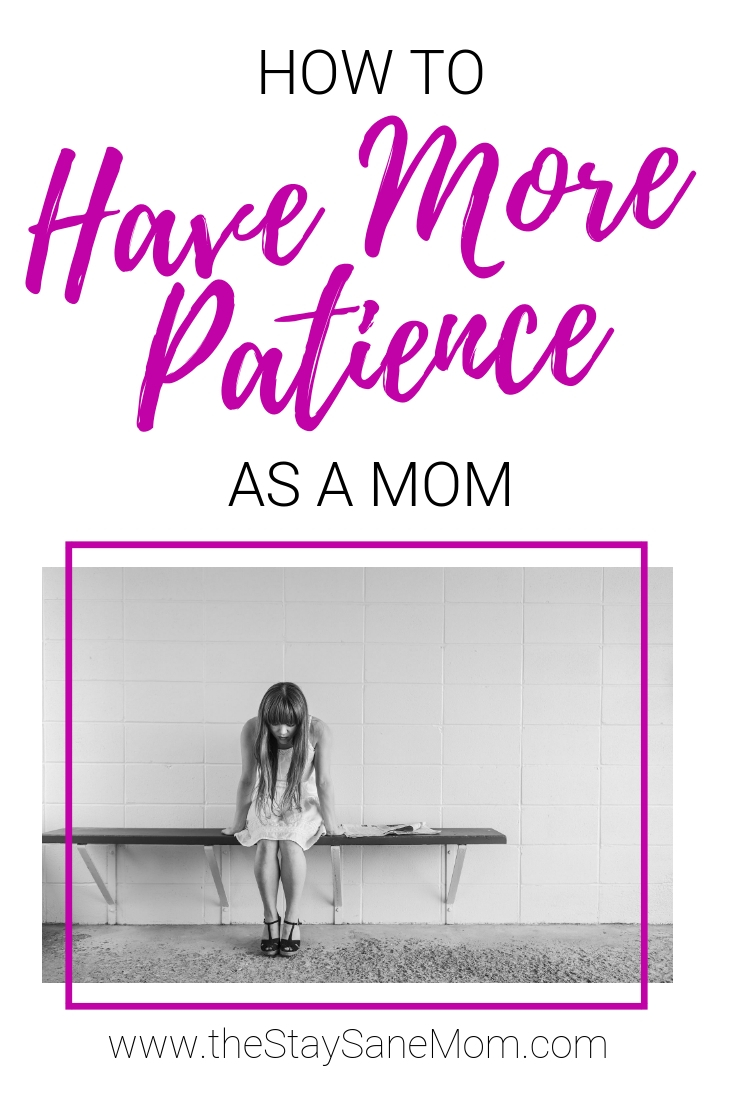
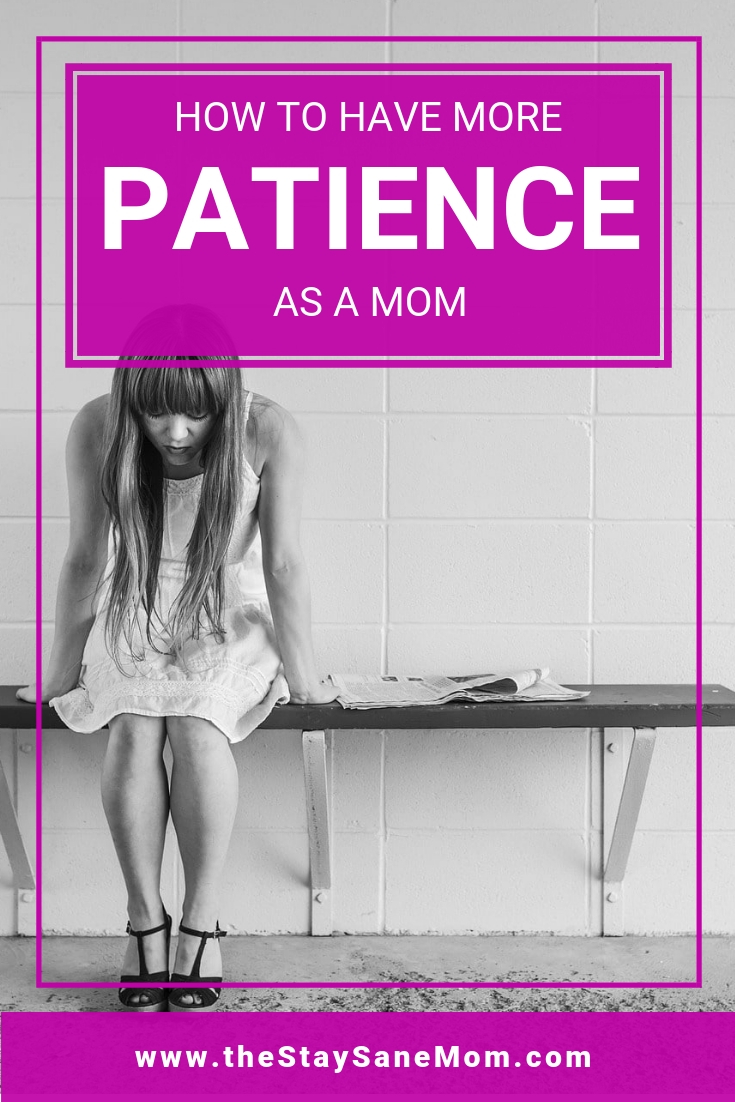
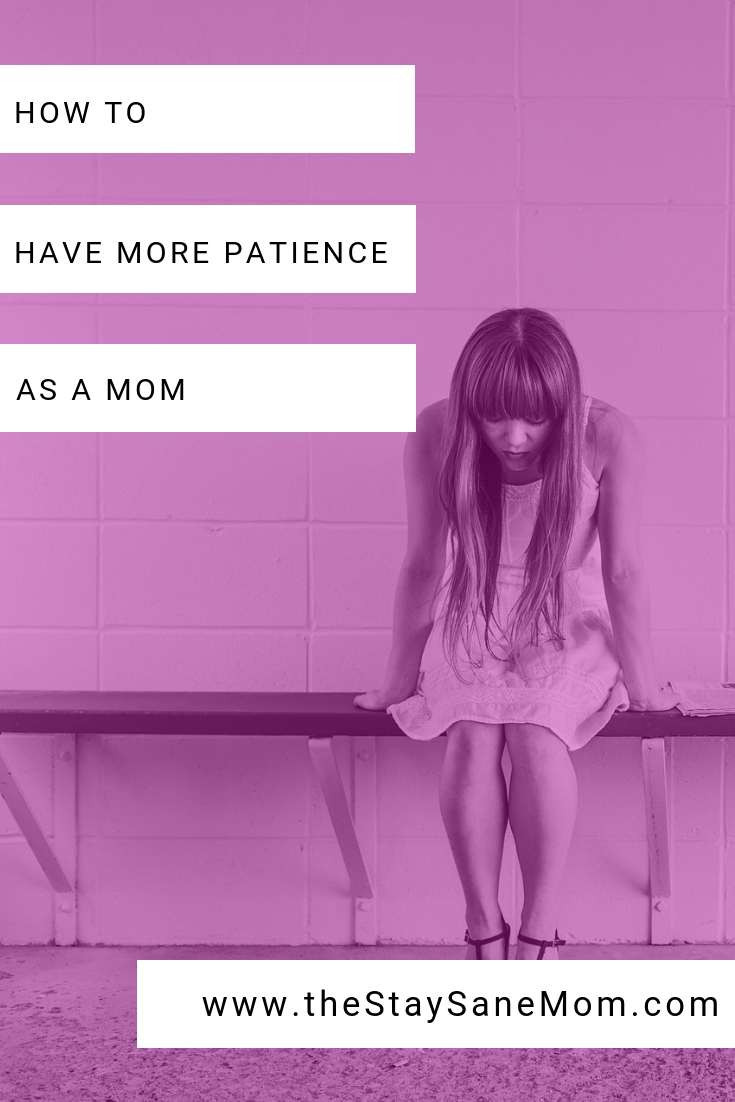
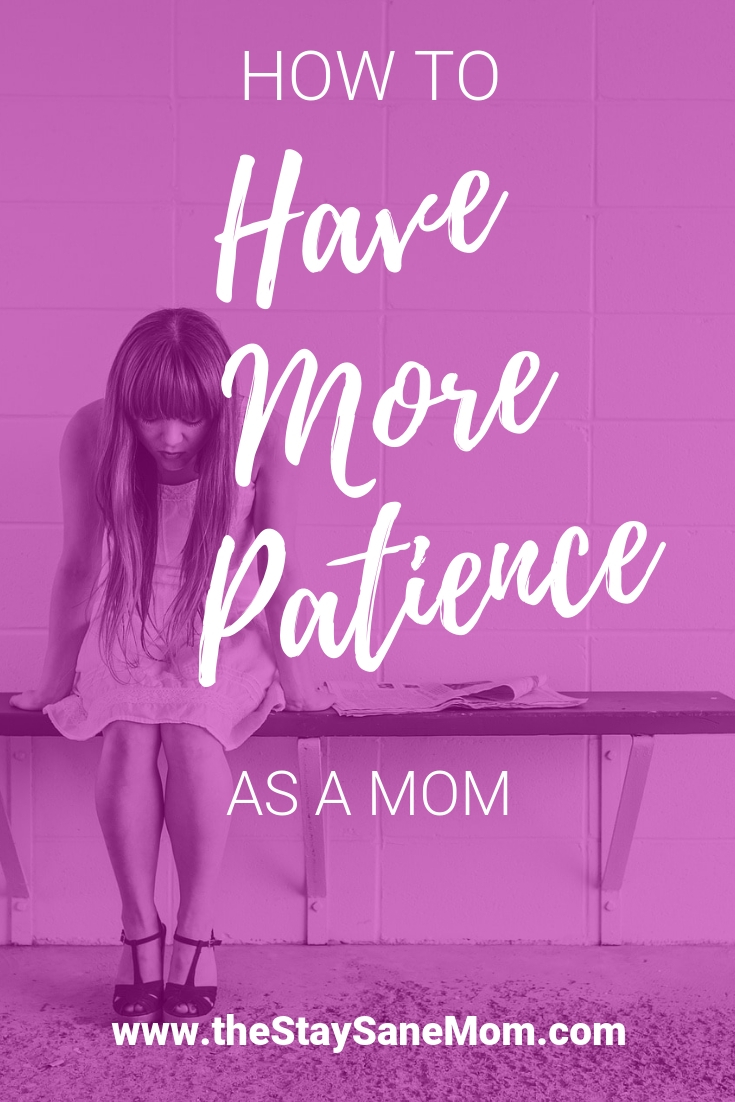
About the Author

Liz Bayardelle, PhD
Founder | Contributor
Liz (or Dr. Mommy, as her toddler started calling her after learning what a PhD was) is the happily sleep-deprived mom of a toddler (and professional raccoon noise impersonator), a sparkle-clad kidnado, a teenage stepdaughter, 200 cumulative pounds of dog, and herd of dustbunnies (if daily vacuuming doesn't occur). During nights and naptimes, she uses her PhD in business psychology as an author, speaker, and consultant. She also serves as an executive and principal for three companies, two of which she co-founded with her very patient (and equally exhausted) husband.





-Budget.jpg)